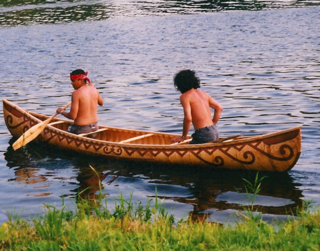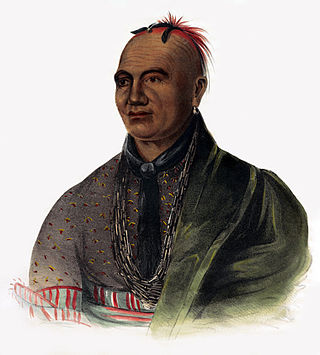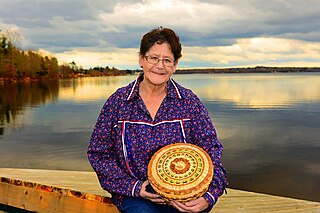Related Research Articles

The Abenaki are an Indigenous peoples of the Northeastern Woodlands of Canada and the United States. They are an Algonquian-speaking people and part of the Wabanaki Confederacy. The Eastern Abenaki language was predominantly spoken in Maine, while the Western Abenaki language was spoken in Quebec, Vermont, and New Hampshire.

Passamaquoddy Indian Township Reservation is one of two Indian reservations of the federally recognized Passamaquoddy tribe in Washington County, Maine, United States. The population was 760 at the 2020 census. Most of the 2,500 members of the tribe in the United States live in other parts of Maine. The reservation is located about 13 miles west-northwest of the city of Calais.

Passamaquoddy Pleasant Point Reservation is one of two reservations of the federally recognized Passamaquoddy tribe in Washington County, Maine, United States. The population was 692 as of the 2020 census.
The Penobscot are an Indigenous people in North America from the Northeastern Woodlands region. They are organized as a federally recognized tribe in Maine and as a First Nations band government in the Atlantic provinces and Quebec.

The Passamaquoddy are a Native American/First Nations people who live in northeastern North America. Their traditional homeland, Peskotomuhkatik, straddles the Canadian province of New Brunswick and the U.S. state of Maine in a region called Dawnland. They are one of the constituent nations of the Wabanaki Confederacy.

The Maine Legislature is the state legislature of the U.S. state of Maine. It is a bicameral body composed of the lower house Maine House of Representatives and the upper house Maine Senate. The Legislature convenes at the State House in Augusta, where it has met since 1832.
The Wəlastəkwewiyik, or Maliseet, are an Algonquian-speaking First Nation of the Wabanaki Confederacy. They are the indigenous people of the Wolastoq valley and its tributaries. Their territory extends across the current borders of New Brunswick and Quebec in Canada, and parts of Maine in the United States.

Indigenous peoples of the Northeastern Woodlands include Native American tribes and First Nation bands residing in or originating from a cultural area encompassing the northeastern and Midwest United States and southeastern Canada. It is part of a broader grouping known as the Eastern Woodlands. The Northeastern Woodlands is divided into three major areas: the Coastal, Saint Lawrence Lowlands, and Great Lakes-Riverine zones.
Melvin Joseph Francis was the governor of the Passamaquoddy Pleasant Point Reservation, one of two reservations in Maine of the Passamaquoddy Indian tribe, from 1980 until 1990 and again since 2002.

Joint Tribal Council of the Passamaquoddy Tribe v. Morton, 528 F.2d 370, was a landmark decision regarding aboriginal title in the United States. The United States Court of Appeals for the First Circuit held that the Nonintercourse Act applied to the Passamaquoddy and Penobscot, non-federally-recognized Indian tribes, and established a trust relationship between those tribes and the federal government that the State of Maine could not terminate.
Thomas Norton Tureen is an American lawyer and entrepreneur known for his work with American Indian tribes. While an attorney with the Native American Rights Fund he pioneered the use of the Nonintercourse Act to obtain return of tribal lands lost 180 years earlier and federal recognition for previously non-federally recognized tribes. Tureen successfully litigated Joint Tribal Council of the Passamaquoddy Tribe v. Morton (1975), which established that the federal government has a trust responsibility to protect the land of all tribes, including those not previously recognized. Between 1972 and 1983 he helped obtain federal recognition for and the return of over 300,000 acres to five New England tribes. Tureen's work on behalf of the tiny Mashantucket Pequot Tribe in Connecticut led to the creation of the Foxwoods Resort Casino, one of the largest casinos in the world. He arranged the acquisition of Dragon Cement, New England's only cement producer, by the Passamaquoddy Tribe ; the acquisition of Phoenix Cement by the Salt River Pima Maricopa Indian Community ; originated 250 MW Moapa Solar, the first utility scale solar project in Indian Country and had lead responsibility for the creation of a partnership controlled by the Morongo Band of Mission Indians that holds an option to acquire a $400 million interest in an electric transmission upgrade in Southern California.
Vera J. Francis is a Native American educator, environmental activist, and community planner for the Passamaquoddy people. She resides in Perry, Maine within the Passamaquoddy Pleasant Point Reservation (Sipayik). Francis writes and speaks frequently about environmental issues and tribal politics in newspapers, at conferences and on websites.
Concouguash, christian name Francis Joseph Neptune, (1735–1834) was chief of the Passamaquoddy tribe during the American Revolutionary War. He succeeded his father, Bahgulwet, who died in 1778, and was succeeded by his own son, John Francis Neptune, in 1824. The term "chief" later became the word for governor. Becoming chief is passed along through family lineage and requires acceptance from the Passamaquoddies, Penobscots and Maliseet tribes. These three tribes share similar chief induction ceremonies, conducted simultaneously with eyewitnesses from each tribe present.
The Maine Indian Newsletter was a monthly newsletter published independently from 1966 to 1972 in Gardiner, Maine and Freeport, Maine. While the exact address is not listed, the office was on Pine Street in Freeport. All of the articles archived by Dawnland Voices have Pine Street listed as the place to send submissions and money.

Maulian Dana is the first individual to hold the position of the Penobscot Nation Tribal Ambassador. Chief Kirk Francis appointed her in September 2017.
Rena D. Newell is the Passamaquoddy tribal representative to the Maine House of Representatives. As of February 2020, she is serving her second two-year term and is the only tribal representative in the Maine House.

Molly Neptune Parker was an American basket weaver. She became well known for her artistry, with her works selling for thousands of dollars. As a co-founder and president of the Maine Indian Basketmakers Alliance, she tutored young people in the traditional craft and also educated four generations of her own family. She was also the first woman lieutenant governor of Indian Township, one of the two governing bodies of the Passamaquoddy tribe.

Tomah Joseph (1837–1914), a.k.a.Joseph Tomah and Tomah Josephs, was a Passamaquoddy artist and governor of communities in Maine in the United States. He taught the future US president Franklin Delano Roosevelt how to canoe.